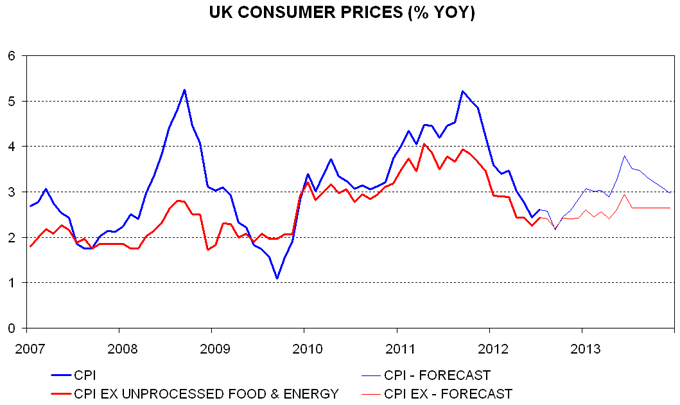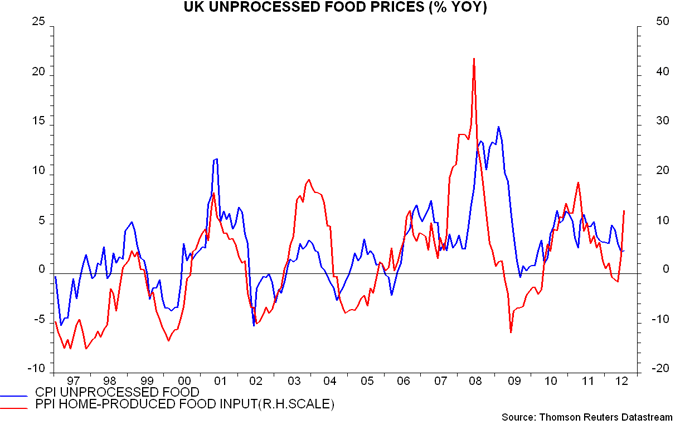Has he called the turn again? At the August 2009 Inflation Report press conference, Bank of England Governor Mervyn King opined, “It is more likely than not that later this year I will need to write a letter to the Chancellor to explain why inflation has fallen more than one percentage point below the target.” CPI inflation bottomed at 1.1% the following month before surging to 3.5% in January 2010, requiring Mr King to find excuses in the opposite direction.
Fast forward to the Governor’s self-congratulatory opening remarks at this month’s press conference. “A year ago inflation was rising and heading towards 5%. It has now fallen to within touching distance of the 2% target. The big picture in today’s Report is of a further decline in inflation, as external influences fade and domestic cost pressures ease …” Unlikely before, this forecast has been torpedoed by the recent rise in energy and food commodity prices. CPI inflation may bottom at 2.1% in September and rebound to 3.1% by January, forcing the Governor to resume letter-writing duties – see first chart for a possible profile.
The forecast assumes that:
-
Unleaded petrol rises to £1.45 per litre by January 2013 to reflect current wholesale gasoline costs and a scheduled 3 pence duty hike, with a comparable increase for diesel.
-
Energy companies follow SSE’s lead and raise household gas and electricity tariffs by an average 7.5% this autumn (SSE announced a 9% increase this week, to take effect in October).
-
Unprocessed food inflation rebounds from 2.3% in July to 5% (possibly conservative given a 12.7% rise in the producer input price index for home-produced food in the year to July – second chart).
-
Higher undergraduate tuition fees add 0.2 percentage points to CPI inflation from October.
-
“Core” inflation – i.e. excluding the above factors – runs at 2.4%, the average of the last five years (after adjusting for VAT changes), variance around which has been small despite economic upheavals.
No allowance has been made for the possibility that Chancellor Osborne will attempt to plug the emerging gap in his fiscal plans with another VAT hike or outsized rises in excise duties.
The Bank of England, of course, will argue that it should not be held responsible for an inflation rise caused by commodity price strength related to actual or feared supply shortages. This defence, however, will be unconvincing if, as expected, core inflation remains above 2%. Upward pressure on commodity prices, moreover, has been fuelled by the additional liquidity injected by G7 central banks in knee-jerk response to economic weakness, with the Bank in the vanguard of monetary experimentation.
The Governor’s persistent tendency to underpredict inflation is judged here to reflect dogged adherence to a broken model rather than a sly attempt to exploit a supposed trade-off with growth and / or “inflate away” debt. The MPC’s inflation-fighting credibility, nevertheless, would be enhanced by the appointment of a successor able to demonstrate a better forecasting record and less prone to hubristic wishful thinking.

